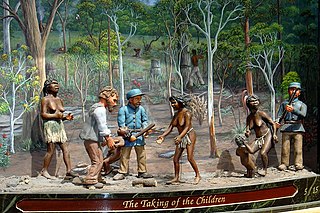
The Stolen Generations were the children of Australian Aboriginal and Torres Strait Islander descent who were removed from their families by the Australian federal and state government agencies and church missions, under acts of their respective parliaments. The removals of those referred to as "half-caste" children were conducted in the period between approximately 1905 and 1967, although in some places mixed-race children were still being taken into the 1970s.
Native title refers to rights, recognised by Australian law, held by Aboriginal and Torres Strait Islander groups or individuals to land that derive from their maintenance of their traditional laws and customs. These Aboriginal title rights were first recognised as a part of Australian common law with the decision of Mabo v Queensland in 1992. The doctrine was subsequently implemented and modified via statute with the Native Title Act 1993.
The Select Committee on Reserves Bill 2003 is an Australian select committee that investigated the eviction of the Swan Valley Nyungah Community (SVNC) from their traditional land through the use of the Reserves Bill 2003. It investigated the motives of the Western Australian Gallop government in proposing and passing the bill.
Reconciliation Australia is a non-government, not-for-profit foundation established in January 2001 to promote a continuing national focus for reconciliation between Indigenous and non-Indigenous Australians. It was established by the Council for Aboriginal Reconciliation, which was established to create a framework for furthering a government policy of reconciliation in Australia.
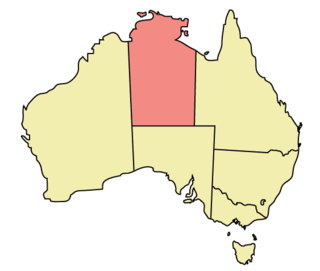
Crime in the Northern Territory is managed by the Northern Territory Police, the territory government's Department of the Attorney-General and Justice and Territory Families.

The Native Title Act 1993(Cth) is a law passed by the Australian Parliament, the purpose of which is "to provide a national system for the recognition and protection of native title and for its co-existence with the national land management system". The Act was passed by the Keating government following the High Court's decision in Mabo v Queensland (No 2) (1992). The Act commenced operation on 1 January 1994.
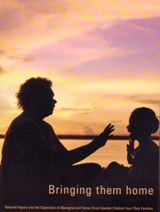
Bringing Them Home is the 1997 Australian Report of the National Inquiry into the Separation of Aboriginal and Torres Strait Islander Children from Their Families. The report marked a pivotal moment in the controversy that has come to be known as the Stolen Generations.

The Redfern Park Speech, also known as the Redfern speech or Redfern address, was made on 10 December 1992 by the then Australian Prime Minister, Paul Keating, at Redfern Park, which is in Redfern, New South Wales, an inner city suburb of Sydney. The speech dealt with the challenges faced by Indigenous Australians, both Aboriginal Australian and Torres Strait Islander peoples. It is still remembered as one of the most powerful speeches in Australian history, both for its rhetorical eloquence and for its ground-breaking admission of the negative impact of white settlement in Australia on its Indigenous peoples, culture and society, in the first acknowledgement by the Australian Government of the dispossession of its First Peoples. It has been described as "a defining moment in the nation's reconciliation with its Aboriginal and Torres Strait Islander people".

Aboriginal title is a common law doctrine that the land rights of indigenous peoples to customary tenure persist after the assumption of sovereignty to that land by another colonising state. The requirements of proof for the recognition of aboriginal title, the content of aboriginal title, the methods of extinguishing aboriginal title, and the availability of compensation in the case of extinguishment vary significantly by jurisdiction. Nearly all jurisdictions are in agreement that aboriginal title is inalienable, and that it may be held either individually or collectively.
Sue Gordon is an Aboriginal retired magistrate from Western Australia who has been locally and nationally honoured for her work with Aboriginal people and in community affairs. She is known for being chair of the Gordon Inquiry in 2002.
Little Children are Sacred, or Ampe Akelyernemane Meke Mekarle, is the report of a Board of Inquiry into the Protection of Aboriginal Children from Sexual Abuse, chaired by Rex Wild and Patricia Anderson. Commissioned by the government of the Northern Territory, Australia, the report was publicly released on 15 June 2007.
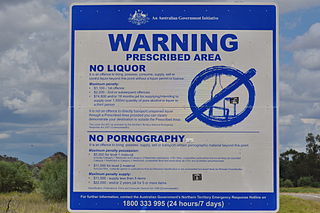
The Northern Territory National Emergency Response, also known as "The Intervention" or the Northern Territory Intervention, and sometimes the abbreviation "NTER" was a package of measures enforced by legislation affecting Indigenous Australians in the Northern Territory (NT) of Australia, which lasted from 2007 until 2012. The measures included restrictions on the consumption of alcohol and pornography, changes to welfare payments, and changes to the delivery and management of education, employment and health services in the Territory.
Breaking the Silence may refer to:
A community legal centre (CLC) is the Australian term for an independent not-for-profit organisation providing legal aid services, that is, provision of assistance to people who are unable to afford legal representation and access to the court system. They provide legal advice and traditional casework for free, primarily funded by federal, state and local government. Working with clients who are mostly the most disadvantaged and vulnerable people in Australian society, they also work with other agencies to address related problems, including financial, social and health issues. Their functions may include campaigning for law reform and developing community education programs.
In Australia, domestic violence (DV) is defined by the Family Law Act 1975. Each state and territory also has its own legislation, some of which broadens the scope of that definition, and terminology varies. It has been identified as a major health and welfare issue. Family violence occurs across all ages and demographic groups, but mostly affects women and children, and at particular risk are three groups: Indigenous, young and pregnant women.
Indigenous Australians are both convicted of crimes and imprisoned at a disproportionately higher rate in Australia, as well as being over-represented as victims of crime. As of September 2019, Aboriginal and Torres Strait Islander prisoners represented 28% of the total adult prisoner population, while accounting for 2% of the general adult population. Various explanations have been given for this over-representation, both historical and more recent. Federal and state governments and Indigenous groups have responded with various analyses, programs and measures.
Child sexual abuse is a matter of concern in Australia, and is the subject of investigation and prosecution under the law, and of academic study into the prevalence, causes and social implications.
The Women's Legal Service NSW formerly the Women's Legal Resource Centre, is an independent, non-aligned, non-profit organisation funded by the Australian Commonwealth and state governments. It is part of the Community Legal Centre Network. WLS NSW promotes access to justice, particularly for women who are disadvantaged by their social or economic circumstances.
Australians for Native Title and Reconciliation (ANTaR) is an independent, national non-government, not-for-profit, community-based organisation founded in 1997 which advocates for the rights of Aboriginal and Torres Strait Islander people in Australia and aims to help overcome disadvantage. Its staff, board and membership comprise mainly non-Indigenous people who support Indigenous voices and interests.
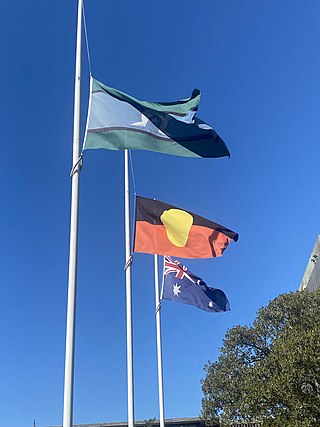
Reconciliation in Australia is a process which officially began in 1991, focused on the improvement of relations between the Aboriginal and Torres Strait Islander peoples of Australia and the rest of the population. The Council for Aboriginal Reconciliation (CAR), created by the government for a term of ten years, laid the foundations for the process, and created the peak body for implementation of reconciliation as a government policy, Reconciliation Australia, in 2001.







